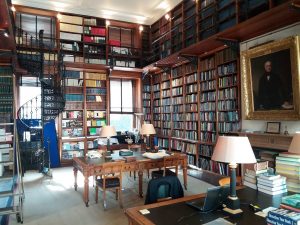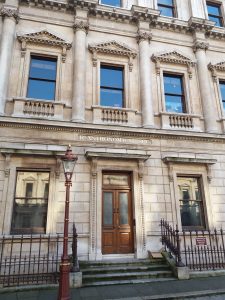So I just finished my first week at the Royal Astronomical Society, on an internship funded by the Charity Insights scheme, (which I guess you’ve figured out, by finding this blog). The Royal Astronomical Society is the national learned society covering Astronomy, Astrophysics and surprisingly, Geophysics. It’s nearly 200 years old, celebrating its 200th Anniversary in 2020.
The headquarters of the RAS are in Burlington House, just off Piccadilly and they are surrounded by a plethora of other societies, such as the Royal Society of Chemistry, Royal Geological Society and the Royal Academy of Arts. (On the left is a pretty picture of the entrance for the RAS)
With the first week of my internship over, I’ve been working mainly between assisting with the library(pretty picture featured), outreach and education and some policy work.

I hit the ground running on Monday, being given a project by one of my supervisors, the head of library and archives, Sian. The project consisted of producing a short guide on using the Astrophysical Data System, a database run by the Smithsonian holding information on Astrophysics, Astronomy, Physics and Geophysics papers. I firstly got familiar with the system, never having used it before, and took Monday and Tuesday to draft it.
However! I was also given a policy project looking into possible arrangements of the UK’s science & technology relationship with the EU post-Brexit, specifically over arrangements regarding Horizon2020. Now this is something that has been incredibly meaty and head-racking, taking up quite a bit of my time and something that will probably take up quite a bit of my time over the remaining 3 weeks. Albeit it being confusing and lengthy (just like the Brexit negotiations!), it has been quite interesting finding and ingesting the EU legal documents on the subject.
On Tuesday, apart from the previous two projects mentioned, I partook in a teacher tour, where a group of teachers were shown the variety of activities that the RAS provides in outreach, such as demonstrations on the composition of a comet(using dry ice!) and some of the archives/antiquities they possess, like Caroline Herschel’s observations diary (The first woman to ever be paid as a Scientist, if you have time, google her story).
My Thursday and Friday continued in the same vein in regards to my policy work, but I also attended meetings regarding some other projects RAS is working on, such as a PhD careers event and assisting the City of Westminster Library. I also got my first taste of cataloguing and archiving.
So far, the experience has been a great change of pace and it’s been amazing working in an organisation which is all about space!
My next week includes continuing my EU research, drafting letters to send to politicians and helping prepare for the Royal Astronomical Society Open House on Sat 16th September, which I will also be assisting in.
Signing off until next week,
Richard
